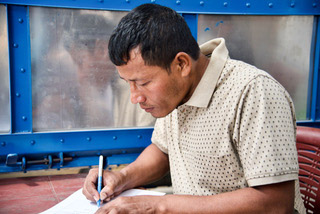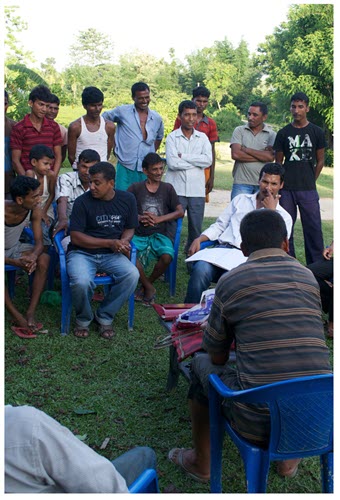Equifarm tea is a new brand with deep roots. In 2017 New Delhi-based Grassroots Tea Corp. first shared its vision for transforming the livelihoods of 250,000 of India’s small tea growers (STGs) by processing and marketing well-made chemical-free teas. Subsistence growers with generations of experience understand how to cultivate tea but are held back by their inability to add value. Few advance beyond a time-bound role as raw leaf suppliers. Grassroots helps secure financing and then aggregates, repacks, wholesales, and retails authentic teas supplied by collectives. Tea Producer Companies then partner with the collectives to operate mini-factories that process 2,500 kilos of green leaf a day.
Photo caption: From left, Sabin Narzary, Sanibar Boro, Assaigra Boro, Thapsa Boro, Baburam Daimary, Pijush Goyary, Ajith Boro, Bijoy Boro, Kukhol Boro, J. John, Minto Goswami, and Sanjwrang Basumatary.

Assam Smallholders Express Pride of Ownership
By Roopak Goswami
Tea grower Sabin Narzary, 32, is proud and brimming with confidence, as are 260 small tea farmers in the Udalguri and Biswanath districts of Assam.
All are shareholders in a tea producer company, a new business model that enables subsistence growers to finance mini-factories and create local brands collectively. Their new equifarm tea is now on sale on Amazon. The Grassroots Tea Corporation (GTC) launched the product during a virtual meeting on Oct. 8.
Two weeks later their teas debuted on Amazon.in priced from INRs 360 to 605 (US$4.85-$8.15 for 250 grams).

In 2017 New Delhi-based Grassroots Tea Corp. first shared its vision for transforming the livelihoods of 250,000 small tea growers (STGs) by processing and marketing well-made chemical-free teas. Subsistence growers with generations of experience understand how to cultivate tea but are held back by their inability to add value. Few advance beyond a time-bound role as raw leaf suppliers.
“I have not heard about growers becoming shareholders in the small tea grower sector,” says Narzary, a father of two who was raised in Khasiapather. Small tea growers now produce more than half of the millions of metric tons of green leaf grown in India. Producer-members of the Swmkhwr Valley Tea Producer Company contribute green leaf and are granted shares in the venture.
Smallholders in 2020 produced 52% of India’s tea, primarily for production as black CTC (cut, tear, curl) but with a growing segment of specialty tea producers.
The equifarm brand’s tea range includes Premium Orthodox Whole Leaf, Premium Orthodox packaged in stand-up pouches, and orthodox tea and green tea in teabags. Initially, it will be available online on major e-commerce portals like Amazon, Flipkart, and selected cloud kitchens.
Shortly after it was founded, Grassroots Tea encouraged a group of 260 indigenous Bodo small tea farmers in Assam’s Udalguri and Biswanath districts to set up four manufacturing units to process green tea leaves sourced from their farms. Each unit required an investment of INRs 1.3 crores (about US$175,000) to purchase the property, structure, tea-making machinery, and other equipment. The four factories raised the required capital – as equity and as a term loan from Financial Services Limited (NABFIN), a subsidiary of the National Bank for Agriculture and Rural Development (NABARD).
Ten years ago “We were not getting good prices as we used to sell our leaves individually [to bought leaf factories],” explains Narzary. One of the biggest problems and worries of small tea growers in Assam are getting low prices for the green leaf as they are dependent on bought leaf factories.
Protests and demonstrations are ongoing. The Confederation of Indian Small Tea Growers Association (CISTA) says that bought leaf factories pay an average of INRs 15-17 (US$0.20 – 0.23) per kilo for green leaf growers in Assam and West Bengal. Growers say the cost of producing green leaf has increased as much as INRs 19 (US$0.25) per kg due to shipping expense and a tightening supply of fertilizer and other inputs increasing the cost of production.
He said the entry of Centre for Education and Communication (CEC) New Delhi and J. John changed all that, and the growers formed a society to get a higher price for the leaf they supply to the processing factories. The collective leaf trade fuelled the leadership and entrepreneurial aspirations of kindling their desire to move up the value chain. The societies brought their active members as shareholders to constitute producer companies.
While taking advantage of a ‘Company’ registration, like raising capital and sharing profit, the Producer Company framework has the advantage that it runs based on cooperative principles. The shareholders are ‘active producers,’ which means only those who contribute to the supply of green tea leaves can participate. Each shareholder has one vote irrespective of the number of shares owned.
“Our lives are now completely transformed as we are getting good prices for the green leaf and have learnt a lot about tea,” he says.
Kukhol Boro says one of the most significant learning has been the advantage of being united. “Earlier we were selling our green leaf only by ourselves and did not get good prices, later when we became a society, we got better prices,” he says.
“We had difficulties in getting compliances, but now, we can proudly say that we have a factory of our own where we manufacture tea all by ourselves, a dream that we have been chasing for the last eight to 10 years.
Today after many ups and downs, we could make it happen,” he said.

“We have many more miles to go, but today is the beginning, today is the day of farmers, today is the day of GTC. Let the small tea growers of the world unite and be active part of the value chain,” Kukhol Boro said.
“We could never imagine that one day the growers would be owning factories as members of societies,” added Kukhol Boro.
Grassroots Tea has a packaging unit in Barpeta, Assam.
“It is a market linked to the farmers’ movement in which farmers own and govern various stages of value accrual of an ethical product and obtain a reasonable share of the value accrued. It also establishes a direct connect between farmers and consumers by making available high quality ethical, ecologically sound and traceable natural tea,” said J. John, managing director of Grassroots Tea.
GTC provides support at three distinct stages: empowering small tea growers (STGs) to cultivate chemical-free tea; assisting STGs in raising equity to set up Tea Producer Companies (under the Company Act, 1953) to build processing factories that manufacture high quality, certified orthodox tea; and when the tea is made Grassroots aggregates and markets the tea to conscious consumers under the joint ‘equifarm tea’ brand.
Teas are natural, traceable, single-origin (subsumed within geographical indicators); made and owned by small tea farmers, ensuring a sustainable livelihood and an optimum share of the profits, he said.
“Our long term vision is to transform socio-economic outcomes for 250,000 small tea growers at risk, in India. We want to ensure dignity and economic justice for all STGs by enabling fair compensation at multiple levels of value accrual throughout the value chain,” John says.
India needs an alternate model for the tea-value chain as a core strategy to drive systemic change. In this model, subsistence tea farmers organize in collectives that own and actively participate in the value-creation and value-sharing processes, he explains.
“As part of our long-term vision, we will facilitate the setting up of more STG owned tea producer companies (TPC) across India, directly impacting larger number of STG households and worker households,” he added. In time big brands and retailers will recognize and execute, the principle of fair compensation at value accruals.
At the virtual launch event, Adina Pasula, Supply Chain leader, IKEA, Sweden, commented on the distress faced by small-time farmers across the world: “Social entrepreneurship like the equifarm tea is contributing in addressing their plight,” she said. Initiatives of this nature lead to systemic change and would have a collective impact across stakeholders at various levels, she said.
NABARD General Manager Baiju Kurup praised the GTC model. He said that during the “last couple of years, NABARD’s major focus has been in the facilitation of the aggregation of farmers to a farmers’ producer company, or FPO, where better share of the price can be transferred to the producers so that they enjoy better price realization.”
CISTA president Bijoy Gopal Chakraborty said, “in equifarm tea, we see the prominent footprint of the small tea growers in India.”
Share this post with your colleagues.
Signup and receive Tea Biz weekly in your inbox.
https://feeds.sounder.fm/10363/rss.xml






9 responses to “Grassroots Tea”
I love this model. great to see these types of initiatives happening in India too.
It’s heartening to see and they have their own brand too. The people working in the small tea farms in Assam needs to get equal wages like their counterparts in the organised sector.
This is truly a wonderful initiative! It’s high time small tea growers get their due. We need to buy, spread the word, and support this.
Totally agree.
The beauty is that they are Family Farmers producing Safe Food.
I see lot of possibilities in transforming livelihoods of smallholder tea chain in India… The Grassroots Tea Corporation (GTC) is beginning towards equity, social and economic justice initiative in tea sector… We must campaign of many more such innovative action s for the poor and vulnerable… The CEC is the first NGO worked for STGs since 2005-2006 onwards and the active role of J John in particular.
Workers working in small tea farms need to get equal wages and benefits from govt schemes like their counterparts in the organised sector. The day this is done, one will find the tea industry going up.
We feel proud to be a owner of unit and being able to be a part of value chain. This will definitely sustain small tea growers.?????
Thanks Mr. Roopak for the enlightening story. Thanks tea-biz.com for communicating the innovative venture by farmers to a wider audience.